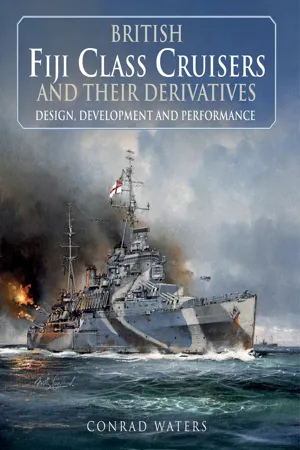
- 408 pages
- English
- ePUB (mobile friendly)
- Available on iOS & Android
British Fiji Class Cruisers and their Derivatives
About This Book
A follow-up to the author's highly regarded history of British 'Town' class cruisers, this book takes the same approach, combining coverage of the development, design details and career highlights of the original class as well as the Uganda, Minotaur and Tiger designs that were derived from them. Often called the 'Colony' class, they were an attempt to incorporate the characteristics of the preceding 'Town' class within the reduced 8, 000-ton limit agreed under the 1936 London Treaty. In general layout, they resembled the earlier class but adopted upright rather than raked funnels and masts. The use of a flat, transom stern conferred both hydrodynamic and internal space advantages. Not surprisingly, they turned out to be very cramped ships which struggled to accommodate all the wartime additions of extra electronics and light AA guns, as well as the increased crew needed to man them. Many of the later modifications to existing ships and alterations to the succeeding designs were attempts to alleviate these issues, most visibly the reduction of the main armament from four to three turrets. Nevertheless, they were available in significant numbers and gave sterling service across all theaters of the naval war. In this major study, Conrad Waters makes extensive use of archive material to provide a technical evaluation of the Fiji class design and its subsequent performance. He outlines the class's origins in the context of inter-war cruiser policy, explains the design and construction process, and describes the characteristics of the resulting ships and how these were adapted in the light of wartime developments. An overview of service focuses on major engagements, assessing the extent to which the class met its designers' expectations and detailing the consequences of action damage. Later chapters continue the story into the Cold War era, examining the various post-war modernization programs and concluding with the radical redesign of the Tiger class that produced the Royal Navy's last conventional cruisers. Heavily illustrated with contemporary photographs, original plans and drawings by Dave Baker, John Jordan and George Richardson, British Fiji Class Cruisers provides a definitive reference to one of the Royal Navy's most important Second World War warship designs.
Frequently asked questions
Information
Table of contents
- Cover
- Title
- Copyright
- Contents
- Preface
- List of Abbreviations
- Chapter 1: Class Origins
- Chapter 2: Fiji Class: Design & Construction
- Chapter 3: Fiji Class: Design Description
- Chapter 4: Wartime Developments:The ‘Modified Fiji’ & ‘Improved Fiji’ Classes
- Chapter 5: Wartime Operations & Performance
- Chapter 6: Post-War Design Development: Existing Ships
- Chapter 7: The Tiger Class
- Chapter 8: Post-War Operations & Disposal
- Chapter 9: Evaluation
- Appendix 1: Camouflage & Appearance
- Appendix 2: Aircraft
- Appendix 3: Battle Honours
- Appendix 4: Revisions to British ‘Town’ Class Cruisers
- Bibliography